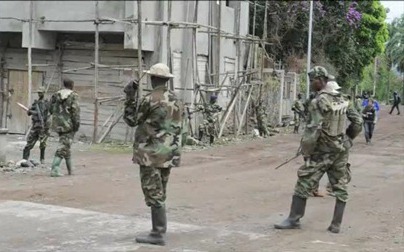 (CNN) -- A rebel group now in control of a key city in eastern Democratic Republic of the Congo announced Wednesday that it plans to "liberate" the entire country.
(CNN) -- A rebel group now in control of a key city in eastern Democratic Republic of the Congo announced Wednesday that it plans to "liberate" the entire country.
A spokesman for the rebel M23 group said its successful operation to take Goma on Tuesday, the culmination of several days of heavy fighting against government forces, was just the beginning.
"We will push on to Bukavu, then Kisangani, and finally take Kinshasa and overthrow the government," Lt. Col. Vianney Kazarama said to enthusiastic cheers from a crowd of several hundred at Goma's stadium, according to a Congolese reporter there.
Kazarama said that once the rebels overthrow the government, they will call for elections.
Kinshasa, the country's capital, lies nearly 1,000 miles to the west of Goma, the capital of North Kivu province.
On Wednesday, M23 consolidated its control of Goma, calling on policemen and the remaining government soldiers in town to integrate with the rebel group.
Activity started to return to normal, with shop owners restarting their businesses -- some after closing their doors for several days because of the tense situation. M23 has called on schools and banks to reopen as early as Thursday.
The front line, according to the rebel fighters, has moved to the west of Goma, to Mugunga.
The U.N. Security Council backed a resolution Tuesday calling for sanctions against the rebel leadership and "those providing external support to the M23."
The United Nations and some donor countries have accused neighboring Rwanda of backing the M23 by providing it with arms, support and even soldiers. Rwandan President Paul Kagame has repeatedly denied the allegation.
U.S. State Department spokeswoman Victoria Nuland said the United States was "gravely alarmed by the rapid deterioration of the security situation in eastern DRC" and that it supported the U.N. Security Council's call for additional sanctions against the M23 and its backers.
Security analysts say the rebellion in eastern DR Congo has dangerous regional implications, including the risk that it could lead to renewed conflict with neighboring Rwanda. Civilians are also suffering, observers say.
Though 1,500 United Nations peacekeeping troops are in Goma and have control of the airport there, a U.N. spokesman said late Tuesday that the situation is at a "critical stage."
"Reports indicate that the M23 has wounded civilians, is continuing abductions of children and women, is destroying property and is intimidating journalists and those who have attempted to resist their control," said Eduardo del Buey, the deputy spokesman for the U.N. secretary-general.
A total of 6,000 troops from the U.N. mission in DR Congo, MONUSCO, are in the wider region of North and South Kivu, patrolling areas of particular insecurity, del Buey said.
The United Nations, the African Union and countries in the region are demanding that M23 immediately stop its attacks, Buey said.
France and Britain also expressed their concerns Tuesday. The British Foreign Office said its minister for Africa, Mark Simmonds, was traveling to Rwanda, DR Congo and Uganda to support efforts to end the crisis.
The eastern part of DR Congo, which includes Goma, has been embroiled in violence since 1994, when Hutu forces crossed the border from Rwanda fearing reprisals following the genocide.
Soldiers from the M23 group were part of the national army as part of peace negotiations brokered in 2009. They broke away from the Congolese army in April, however, complaining of a lack of pay and poor conditions.
Tens of thousands of Congolese, already displaced by previous rounds of fighting in the volatile region, have fled camps around the edges of Goma, according to UNICEF and the medical charity Doctors Without Borders.
CNN's Laura Smith-Spark, Mick Krever and Jamie Crawford contributed to this report.
Portland and Seattle
Free Subscription to Breaking News
Free Subscription to Breaking News























































































































































































































































































































































